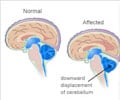According to new research, teens who use methamphetamine could be setting themselves up for age-related brain diseases long after they stop the drug.
Young adults who use methamphetamine could be more prone to age-related brain diseases long after they stop using the drug, according to new animal research published Tuesday.
Scientists were working on the previous hypothesis that early meth abuse can cause the same symptoms as those experienced by Parkinson's disease patients who are missing a key protein, said the findings in the journal Neuroscience.For the study, researchers gave two groups of young mice either methamphetamine or saline injections four times over an eight-hour period.
One group of mice was normal, the other had a partial depletion of glial derived neurotrophic factor (GDNF), a protein that protects and repairs dopamine, an important neurotransmitter, in areas of the brain related to motor control.
Loss of nerve cells that produce dopamine is a major contributor to Parkinson's disease.
The mice were 2.5 months old, or adolescents, at the start of the study. At 12 months old, the GDNF-depleted mice moved significantly less than the normal mice that got the same meth injections, according to the study.
Additionally, the immediate effects of the meth binge were exacerbated in the mice with the GDNF depletion.
Advertisement
The study was funded by the US Army and National Institutes of Health.
Advertisement
Nearly 12 million Americans have tried meth, according to a 2004 federal survey on drug use. Among teens, 6.2 percent of 17- and 18-year-olds in the United States said they have tried meth at least once.
Source-AFP
ANN











